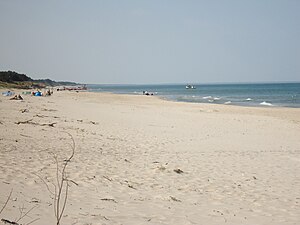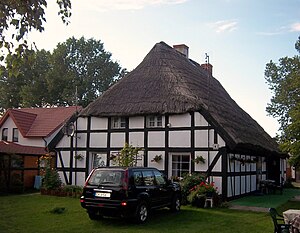Dąbki (Darłowo)
| Dąbki | ||
|---|---|---|

|
|
|
| Basic data | ||
| State : | Poland | |
| Voivodeship : | West Pomerania | |
| Powiat : | Sławieński | |
| Gmina : | Darłowo | |
| Geographic location : | 54 ° 23 ' N , 16 ° 19' E | |
| Height : | 0 m npm | |
| Residents : | 265 | |
| Economy and Transport | ||
| Street : | DW203 Koszalin - Ustka | |
| Rail route : | Darłowo - Sławno - Korzybie | |
| Next international airport : | Danzig | |

Dąbki [ 'dɔmpki ] ( German Neuwasser ) is a village in Western Pomerania . Today it belongs to the rural community (Gmina) Darłowo ( Rügenwalde ) in the Powiat Sławieński ( Schlawe ) of the Polish West Pomeranian Voivodeship .
Geographical location
The small fishing and farming village of Dąbki is located between the northern tip of the Jezioro Bukowo ( German Buckower See ) and the Baltic Sea .
Located on a hill in the coastal lowlands, the place is surrounded by the neighboring communities Łazy ( Laase ) in the west, Bukowo Morskie ( Lake Buckow ) in the south and Bobolin ( Böbbelin ) in the east. The village Dąbkowice ( Damkerort ), which is located on the spit five kilometers to the west, belongs to the village .
The wide meadow depression in the east is crossed by numerous streams. The largest is the Nowo Rów ( Neuer Graben ), which connects the Jezioro Bukowo with the Grabowa ( German Grabow ). Until the Middle Ages there was a now silted up armlet, the "Traht", which connected the Buckower See with the Baltic Sea, the Grabow and the Wieprza (Wipper) and could be navigated with large ships.
The nine kilometer long spit is sometimes only 100 meters wide. Wide expanses of pipes on the lake and fine sandy dunes and beach on the Baltic Sea side are your protection. The formerly known as "Buckower Deep" connects the lake with the sea.
Place name
The German name Neuwasser needs no explanation. The name Neewen Wasser or the Low German name Niewater used to be common.
The New Polish name "Dąbki" suggests the Slavic word for "oak" .
history
The area around Neuwasser came into the possession of the Buckow monastery between 1265 and 1270 . The time when the place was created is not known.
In 1493, Duke Bogislaw X. of Pomerania settled border disputes between the Buckow monastery and the city of Rügenwalde regarding the boundaries of Neuwasser and other communities. Around 1780 the village had 26 fishermen, including Schulze, as well as 8 Büdners and a schoolmaster.
At the beginning of the 20th century, summer tourism developed a new source of income: room rentals to bathers, mostly regulars. Individual artists, especially painters, also settled here.
In 1818 there were 302 people in Neuwasser and Damkerort. Their number was only 234 in 1871, but then rose again to 321 by 1939.
Until 1945, Neuwasser and the municipalities of Böbbelin (now Polish: Bobolin), Büssow (Boryszewo), Lake Buckow (Bukowo Morskie), Lake Suckow (Żukowo Morskie) and Steinort (Gleźnowo) made up the administrative district of Büssow in the Schlawe i district. Pom. The last town mayor was Franz Boje. Neuwasser was officially connected to Böbbelin, Büssow, See Buckow and Steinort to form the Büssow registry office, based in See Buckow.
Towards the end of the Second World War , on March 6, 1945, Soviet troops, coming from the west, occupied the spit with Damkerort and Neuwasser. A Red Army headquarters remained in Neuwasser until 1948 .
It was not until 1948 that the Soviets put the place under Polish administration. Neuwasser received the Polish place name Dąbki . The local villagers were evicted .
church
Protestant church
In Neuwasser and Damkerort, almost all residents belonged to the Protestant church. The place was parish with the villages of Böbbelin, Büssow, Steinort and the (later parish to Petershagen ) branch municipality Pirbstow in the parish See Buckow (Bukowo Morskie). The house of worship for the people of Neuwasser was thus the See Buckow village church . The parish belonged to the church district Rügenwalde of the church province Pomerania in the Protestant church of the Old Prussian Union .
Today the place belongs to the parish of Koszalin ( Köslin ) of the diocese of Pomerania-Greater Poland of the Evangelical-Augsburg Church in Poland .
Catholic Church
The Polish Catholic Church has built a new church in the village.
school
There was already a school in Neuwasser around 1780. The school building, in which around 40 children were taught until 1945, was built around 1880.
Damkerort had its own school.
traffic
The village is connected to the voivodship road No. 203 , which leads from Koszalin ( Köslin ) via Darłowo ( Rügenwalde ) to Ustka ( Stolpmünde ). It is nine kilometers to Darłowo, and the district town of Sławno ( Schlawe ) is 29 kilometers away. Darłowo station is at the track-Darłowo Sławno- Korzybie ( Zollbrueck ).
literature
- Ludwig Wilhelm Brüggemann : Detailed description of the current state of the Königl. Prussian Duchy of Vor and Hinter Pomerania . Part II, Volume 2: Description of the court district of the Royal. State colleges in Cößlin belonging to the Eastern Pomeranian districts. Stettin 1784, p. 860, paragraph 15 ( books.google.de ).
- Werner Wetzel: Neuwasser at Buckower See . In: Pommersches Heimatbuch 1971 . Pommersche Landsmannschaft, Hamburg 1970, pp. 55–62.
- Manfred Vollack (Ed.): The Schlawe district. A Pomeranian homeland book . 2 volumes. Husum 1989.
Web links
- The community of Neuwasser in the former Schlawe district in Pomerania (Gunthard Stübs and Pommersche Forschungsgemeinschaft, 2011)
- District of Büssow (Rolf Jehke, 2011)
- Schlawe home district in Pomerania
See also
Footnotes
- ↑ Ludwig Wilhelm Brüggemann : Detailed description of the current state of the Königl. Prussian Duchy of Vor and Hinter Pomerania . Part II, Volume 2: Description of the court district of the Royal. State colleges in Cößlin belonging to the Eastern Pomeranian districts. Stettin 1784, p. 860, paragraph 15 ( books.google.de ).



